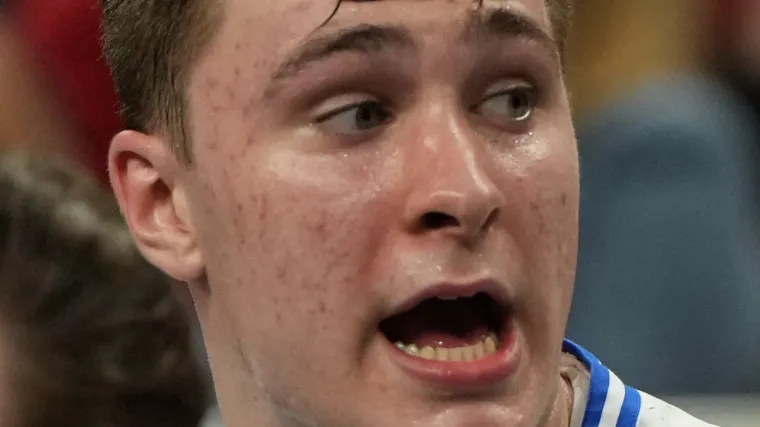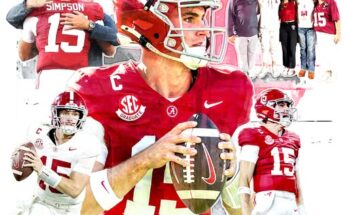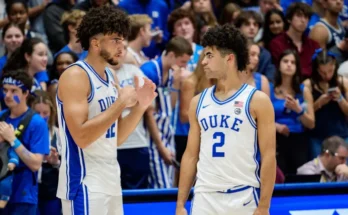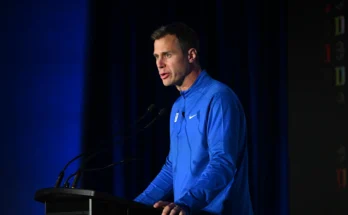Why a Jrue Holiday Trade With Mavericks Makes Sense: Duke’s Cooper Flagg Could Be the Ultimate Prize Behind the Scenes
The NBA is a league built on stars, but it often runs on salary matching and draft capital. In a hypothetical scenario that’s gained some traction among league circles and NBA fans alike, the Dallas Mavericks could become a key trade partner with the Boston Celtics in a Jrue Holiday deal. What makes it even more compelling? The possibility that Duke Blue Devils freshman phenom Cooper Flagg could ultimately be the real winner in this chess match.
At first glance, a Jrue Holiday trade seems like a move made purely for competitive purposes—Holiday, a seasoned veteran and defensive ace, fits any contender’s mold. Yet, for the Mavericks, acquiring him could be less about the player himself and more about leveraging his contract to align with long-term ambitions. It’s a fascinating puzzle involving cap flexibility, a rising blue-chip college star, and the evolving future of NBA roster construction.
To understand the trade mechanics, start with the salary situation. Holiday is on a multi-year extension with the Celtics, but his value—both on the court and on the trade block—hasn’t waned. If Boston decided to pivot, perhaps in response to luxury tax concerns or a reshaping of the roster around Jayson Tatum and Jaylen Brown, Holiday would immediately command significant interest. That’s where Dallas steps in.
The Mavericks are a franchise with a perennial win-now mindset, especially with Luka Dončić entering his prime and Kyrie Irving still on the roster. But they’ve also struggled with balance. Defensively, Dallas has been porous, and Holiday could fix a lot of that instantly. His perimeter defense, ball-handling, and playoff experience would complement Luka without taking away too much usage. Holiday doesn’t need the ball to impact the game—something Jason Kidd’s offense needs in a supporting star.
But this isn’t simply about Holiday bolstering Dallas’ title hopes. The deeper intrigue lies in the potential for a future payoff involving Cooper Flagg.
Flagg, widely viewed as the consensus No. 1 pick in the 2026 NBA Draft, is a once-in-a-generation type of player. He brings a rare combination of length, skill, and defensive tenacity that has scouts comparing him to a young Kevin Garnett with a bit of Luka’s court vision. He’s currently preparing for his freshman season at Duke, and while he’s expected to elevate the Blue Devils back into national title contention, his ultimate value will be felt in NBA front offices planning years ahead.
What if the Mavericks, in acquiring Holiday and sending out matching salaries such as Tim Hardaway Jr., Josh Green, and a pick, are doing more than just improving their current roster? What if they’re also quietly hoarding assets—namely draft capital and movable contracts—for a future move up in the 2026 draft? It’s not outlandish.
Flagg is that good. Teams will tank for him, trade up for him, and perhaps even sacrifice competitive short-term potential for a shot at landing a transformational star. Think Victor Wembanyama or LeBron James in their respective draft years—this is the kind of gravity Flagg brings to the table.
Boston’s side of this is more pragmatic. Holiday’s fit on their roster has been excellent, but the Celtics are already deep into luxury tax territory. With Tatum’s supermax extension looming and Brown’s already on the books, the time could come when the Celtics must choose between versatility and financial sustainability. Offloading Holiday for younger, cheaper talent—while netting a valuable first-rounder or two—could be both a strategic and financial win.
In this scenario, Dallas becomes the ideal partner. The Mavericks have players like Hardaway, Green, Maxi Kleber, and even Richaun Holmes, who can help facilitate the matching salaries. Additionally, Dallas owns future draft picks that could entice Boston to retool rather than rebuild.
There’s a reason why fans and analysts alike are linking these two franchises. The Celtics and Mavericks are in different stages of championship windows. Dallas is looking to maximize the Luka-Irving tandem while it lasts. Boston, despite its elite status, must constantly be aware of the cap cliff they’re skating on. These contrasting realities could produce a rare win-win deal in today’s NBA.
But again, what elevates this trade beyond just numbers and fit is the looming shadow of Cooper Flagg.
Flagg’s presence at Duke is being watched like a hawk by NBA front offices. The Mavericks, while competitive now, are aware that windows close fast. If things don’t go well in the next season or two—say Irving gets injured or the supporting cast underperforms—Dallas might find itself in the lottery or with a valuable pick via a trade. That’s when maneuverability matters.
By trading for Holiday, Dallas doesn’t just improve defensively and gain playoff toughness. They also acquire a player whose contract could be moved again—either to gain picks or to leap up in the draft. There’s precedent. Think of how Oklahoma City has used veterans and draft swaps to stay flexible. Dallas, by following a similar path, could one day find themselves within range of a prospect like Flagg.
It might seem far-fetched now, especially with Flagg still a year away from NBA eligibility, but great front offices think this way. They plan for windows two to three years out. They make moves that work now and still open doors for later. And the Jrue Holiday trade—should it happen—might be the first move in a larger, more ambitious chess game that ends with Cooper Flagg in a Mavericks uniform.
Consider the basketball fit, too. Luka Dončić is a generational talent but needs athletic, defensive-minded teammates who can cover for his weaknesses and run with him in transition. Flagg projects as exactly that kind of player. He can protect the rim, switch on the perimeter, and has high offensive IQ. Pairing Flagg with Luka would be nightmarish for opponents and a dream scenario for Dallas fans.
Even if the Mavericks can’t outright land Flagg, positioning themselves with the assets to try should be considered a victory. The NBA is as much about optionality as it is about certainty. This is how teams like the Denver Nuggets and Miami Heat have remained relevant—they’re always prepared to make the next big move.
From Boston’s perspective, offloading Holiday doesn’t mean giving up. Instead, it could provide the cap relief and young players to reshape the roster. If Jaylen Brown or Kristaps Porziņģis doesn’t fit the timeline in two years, the Celtics could reload on the fly. Brad Stevens has already shown a willingness to make bold moves, and trading Holiday could be one more example.
Ultimately, NBA trades aren’t just about what’s gained in the moment—they’re about positioning for what comes next. For Dallas, trading for Jrue Holiday could be a way to win now and prepare for a future centered around a talent like Cooper Flagg. For Boston, moving on from Holiday at the right price could extend their window rather than shorten it.
Flagg is still months away from playing a single college game, but his shadow looms large. It influences how front offices strategize and how general managers prioritize flexibility. The Mavericks know that if they want to remain a contender in Luka Dončić’s era—and perhaps even build the next superteam—they need to think beyond the present.
Trading for Jrue Holiday might not be about Jrue Holiday at all. It might be about the day Adam Silver steps up to the podium and announces Cooper Flagg as the next face of the NBA. And if that day comes with Dallas on the clock, it will all trace back to the chess moves made in 2025.



